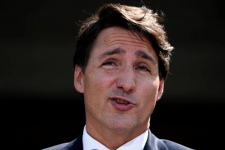It was discussed that A-Stan should be an election issue.
From Tom Mulcair:
SAINT-SAUVEUR, QUEBEC -- And they’re off!…
The race has started and Justin Trudeau has bet everything on his ability to get to the finish line with a majority.
His lead in the polls convinced him to start planning for the election over the past few months. What he couldn’t know in advance was how rapidly and severely the fourth wave would hit. Once you’ve started your engine, done all the planning, bought all the airtime (shaved off your beard!)…it’s pretty hard to stop the infernal machine.
And so it went: set piece meeting with the Governor General, confident walk out of Rideau Hall to all of the waiting microphones and cameras, easy.
He didn’t.
The tough questions came in rapid succession. There was no way to explain the unjustifiable. It was transparent that the only reason Canadians were being forced to go to the polls in the midst of the fourth wave of a pandemic was the self-interest and sense of entitlement of Justin Trudeau and his Liberal Party. It was all about them, not about Canadians.
The most difficult question was one that he refused to answer even though it was repeated several times: what will he do if he fails to win his much-coveted majority?
The journalists knew the answer to their own question: he’d be given his gold watch and a pat on the back by the Natural Governing Party.
In the run-up to the campaign there have been a few issues that have come seemingly out of left field that have caused fits for the Liberals.
The Agency responsible for pesticides had the brilliant idea of announcing a consultation on their plan to increase the amount of glyphosate in the food Canadians eat. The World Health Organization has determined that glyphosate is a probable carcinogen. A mad scramble ensued. They had to find a way to unplug the idea without interfering in the legislated mandate of a regulatory body. They said they’d be consulting on changes to the law and that nothing would be decided before next spring: i.e. until the election is over.
Then all hell broke loose in Afghanistan. Our ever-valiant Ottawa civil servants wanted translators and others who had helped Canada during the war to fill out forms and email them in. An absurd demand on people who are hiding to save their lives in a country with crumbling infrastructure. Trudeau showed that nothing was going to interfere with election planning and a first planeload with Afghan nationals aboard was soon landing, job done! But…
In his prepared statement at the campaign launch, Trudeau was still claiming that 20,000 Afghans were going to be brought to Canada. Images from Kabul later the same day made it clear that that was now unlikely, if not impossible.
The tragedy of Afghanistan will become an element of the campaign because it goes to the core of Canadians’ perception of the government and how it works. Or, in this case, how it doesn’t. It also puts a circle around the stain of an unnecessary election call when there are huge issues like this to be dealt with.
The unfolding Afghan tragedy will provide O’Toole with an opportunity to make an emotional connection in an area where Trudeau simply cannot go. 40,000 Canadians served in Afghanistan. O’Toole is one of the few people to have run for Prime Minister with a military background. He was a Captain in the Air Force before going back to civilian life as a lawyer. That training and experience gives him a unique ability to talk about the sacrifice of the Canadian men and women who served in Afghanistan and the debt owed to those who helped us.
There will be other unforeseen events that will wreak havoc on the best laid plans of all of the parties. But this one issue may well prove crucial. As the dire news continues to come out of Kabul, there will be tragic human stories that will capture Canadians’ attention, much like the pictures of the body of a young Syrian boy on a beach did during the 2015 campaign. You can’t plan for that and Trudeau will be in the same position Harper was, trying to explain his inaction.

